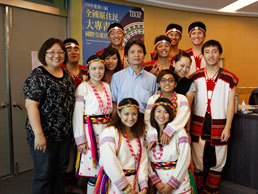Ground-breaking journey to Canada by Taiwan Indigenous Students
 The Executive Yuan’s Council of Indigenous Peoples (CIP) of the Republic of China (Taiwan) has set up a ground-breaking exchange programme which coincides with the 100th anniversary of the Republic of China. The Canada Cultural Exchange Program hosted by the CIP and organized by the Taipei Ricci Institute will bring to Vancouver 15 university students from five separate indigenous tribes spread all over Taiwan. While staying in Canada they will learn about policies and practices which foster indigenous rights, social justice and autonomy.
The Executive Yuan’s Council of Indigenous Peoples (CIP) of the Republic of China (Taiwan) has set up a ground-breaking exchange programme which coincides with the 100th anniversary of the Republic of China. The Canada Cultural Exchange Program hosted by the CIP and organized by the Taipei Ricci Institute will bring to Vancouver 15 university students from five separate indigenous tribes spread all over Taiwan. While staying in Canada they will learn about policies and practices which foster indigenous rights, social justice and autonomy.
The indigenous population in Taiwan is just over half a million accounting for about 2.1% of the population. There are currently 14 recognized aboriginal tribes in Taiwan all with their own distinct culture and language: the Amis, Atayal, Saisiyat, Bunun, Kavalan, Tsou, Rukai, Puyuma, Truku, Paiwan, Tao, Thao, Sakizaya and the Seediq, the latter being the last tribe to be recognized, in 2008. The Council for Indigenous Peoples was founded on December 10, 1996 with the mission of advancing aboriginal issues.
The Ricci Institute draws on its wealth of experience in organising and fostering cross-cultural activities and dialogue to organise a 10-day trip to the Vancouver region from the 4th to the 13th September 2011. They have prepared exchanges with local universities, community organisations, government agencies, indigenous cultural and touristic parks in the Vancouver region so that the students may gain first-hand knowledge and experience of socio-political and economic policies regarding indigenous peoples.
As a precursor to the trip to Vancouver, in July the students also all spent five days in Southeast Taiwan, where they were given preparatory classes in comparative history, English language, and even singing and dancing to put them in good stead for their coming journey.
You can find out more about this journey in the Focus put together by eRenlai Magazine in December 2011
